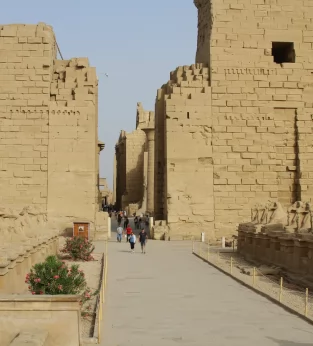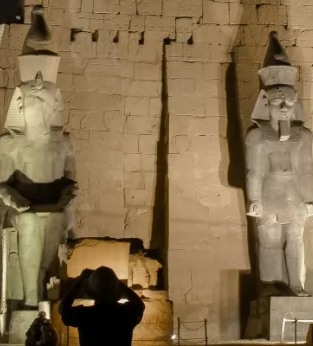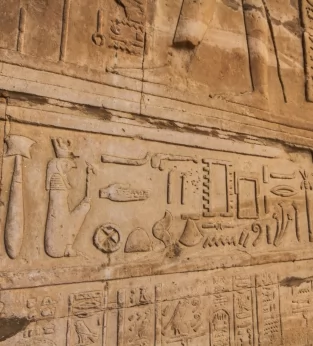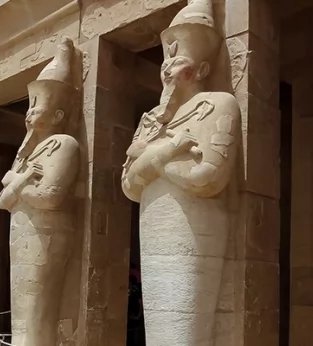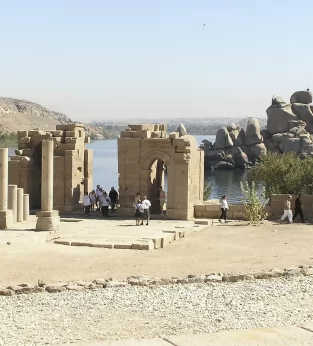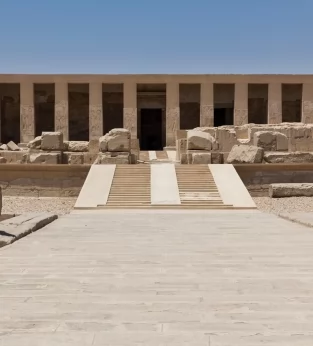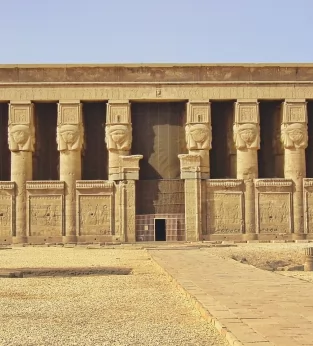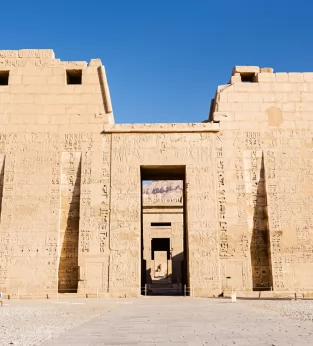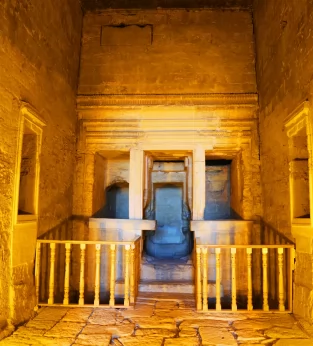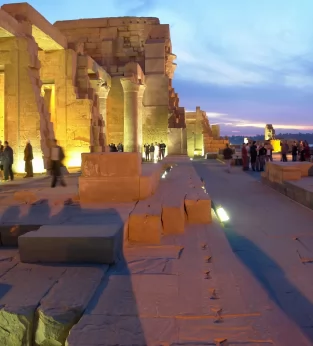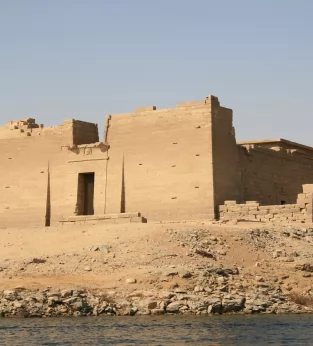Join Our Abu Simbel Temple Tour and Discover Its Secrets
Abu Simbel, located near the Egyptian border with Sudan is one of the most impressive places in Egypt, known for its two massive temples and colossal monuments carved into the rock. They were erected on the orders of Pharaoh Ramesses II in the 12th century BC to display the power of Egypt to the visitors from Nubia.
Due to the construction of the Aswan High Dam and the creation of Lake Nasser, the temples of Abu Simbel were at risk of flooding. To protect them from destruction, in 1964–1968 the temples were moved above the water surface to a place about 65 m higher than their previous location. The Egyptian government and UNESCO funded the operation.
In 1979, the temples were inscribed on the UNESCO World Heritage List.
The monuments in Abu Simbel can easily compete with the Pyramids in Giza as must see monuments on your tour of Egypt. In fact, many say that if you don’t visit these temples your visit to Egypt is incomplete.
Abu Simbel is included in all tour packages we offer. Our Abu Simbel temple tours are organized in two ways: on the Nile cruise from Aswan or by plne from Cairo. On the cruise, which is featured on our 17-Day Egypt Tour with a Long Nile Cruise, 15-Day Egypt Tour with Siwa Oasis, 14 Days in Egypt Tour and 10-Day Tour of Egypt we travel to Abu Simbel in a comfortable coach. By plane from Cairo we also travel to Aswan by coach where we start our cruise on the Nile. This is featured on our 12-Day Red Sea Tour, and 8-Day Egypt Tour.
Our Abu Simbel tour includes visiting the Temple of Ramesses II the Great (great temple) and the Temple of Nefertari (little temple) in the company of a guide who speaks fluent English and is knowledgeable in the temples’ history. Our guide will do his best to make sure visiting the temples of Abu Simbel is relaxing, fun and educational at the same time.
The temples of Abu Simbel are located on the western shore of Lake Nasser, 280 km south of Aswan and 40 km north of the Sudanese border. Both temples in Abu Simbel are very impressive and must be seen. Unfortunately, tourists often overlook them due to the large distance from Cairo, Luxor or Aswan. But when traveling with Inside Egypt, you will be sure to have the opportunity to visit Abu Simbel.
Book one of our luxury Egypt tours or a Nile River Cruise that includes Abu Simbel and see the temples up close!
Abu Simbel Tour Gallery
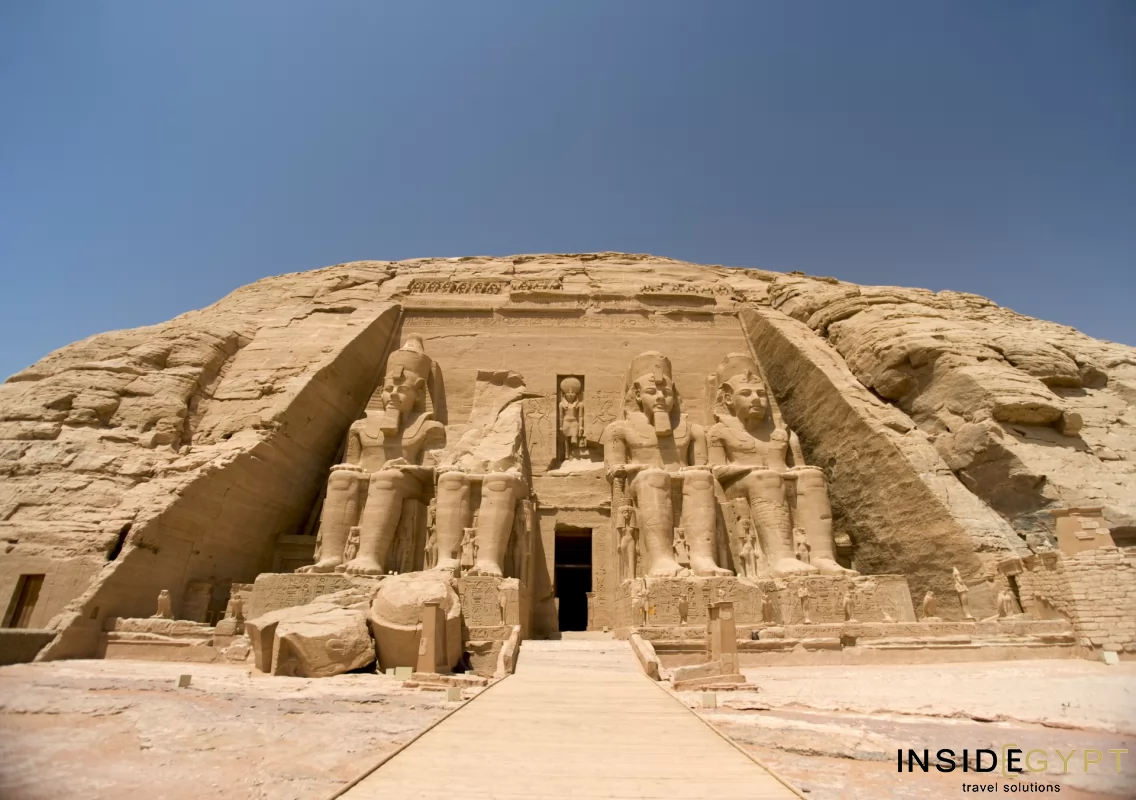
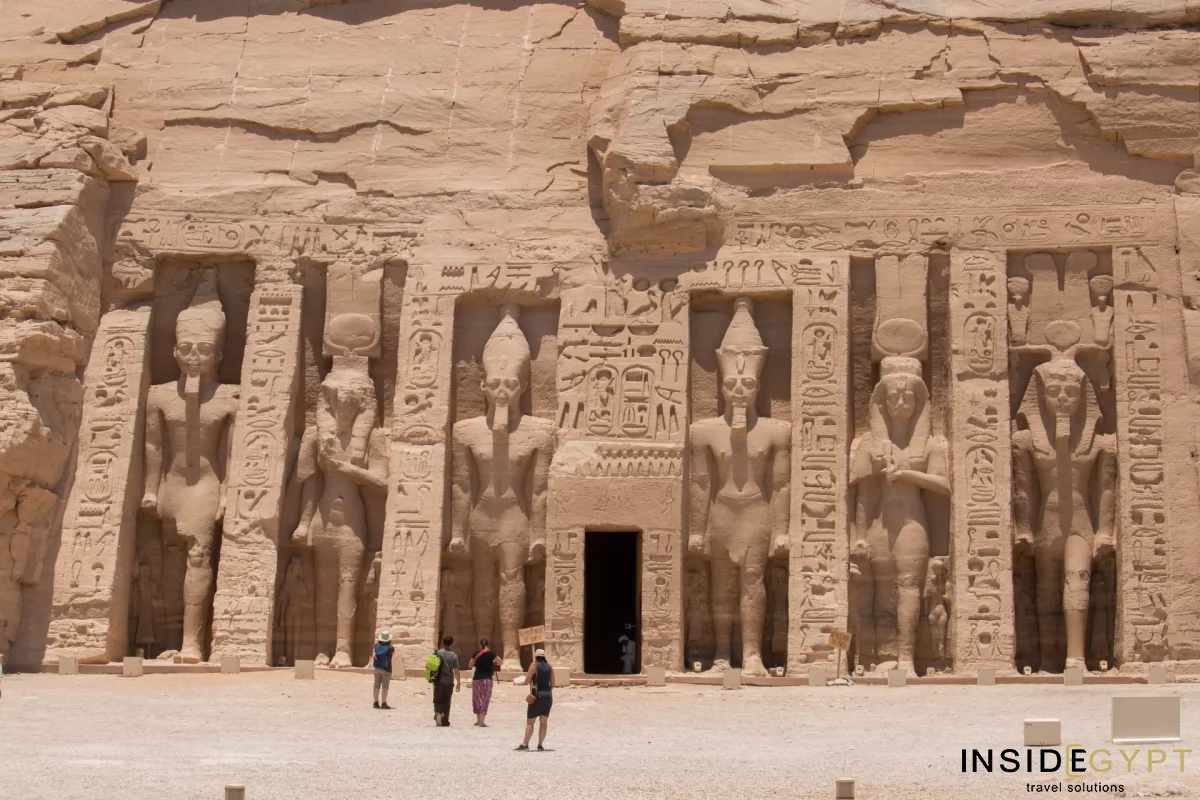
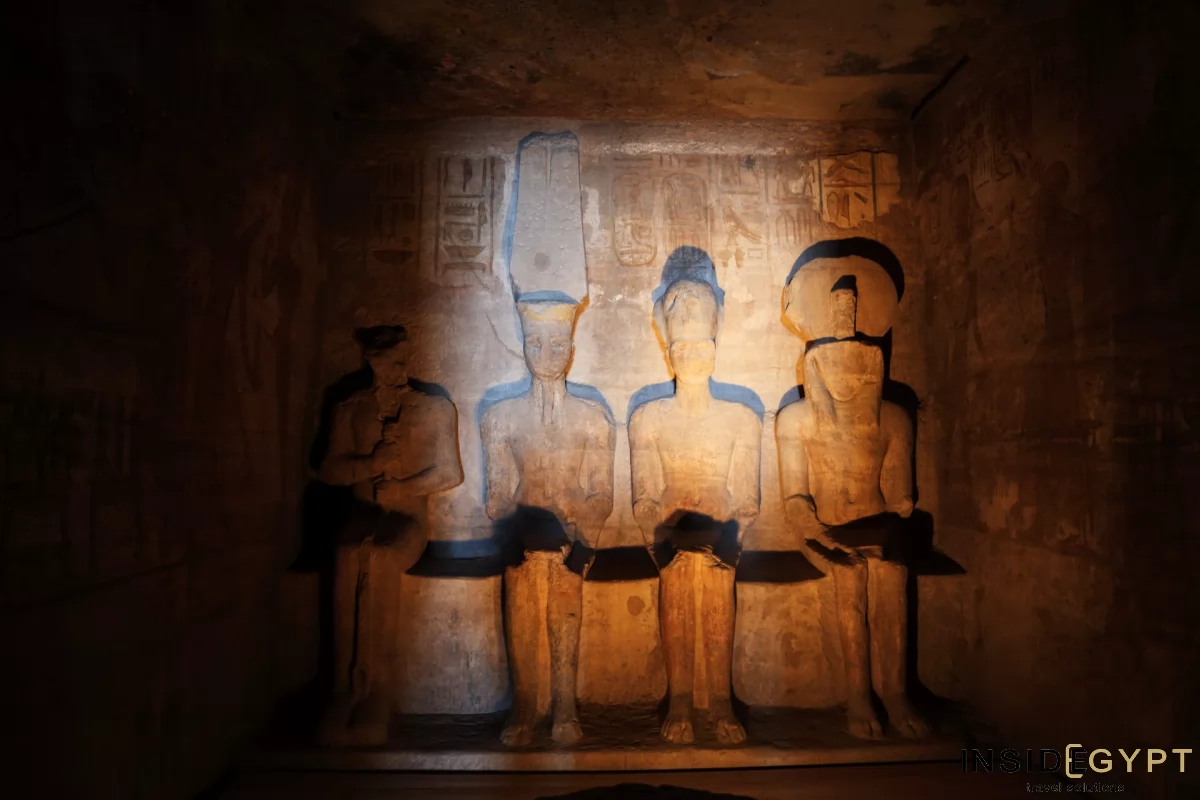
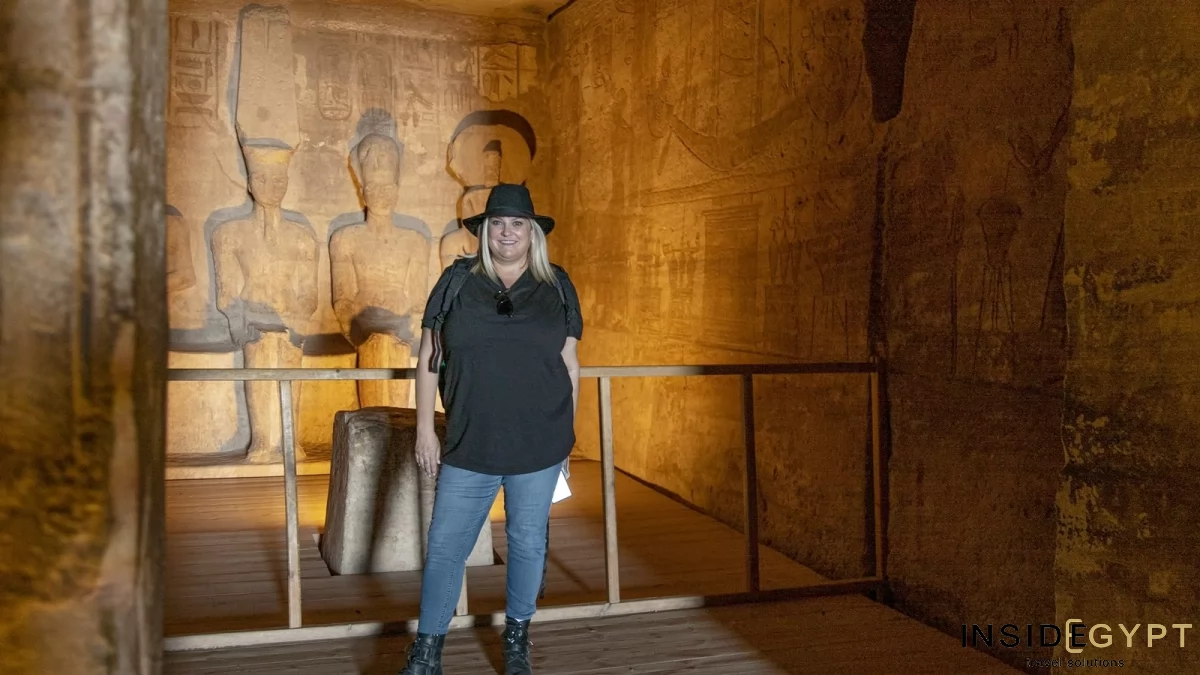
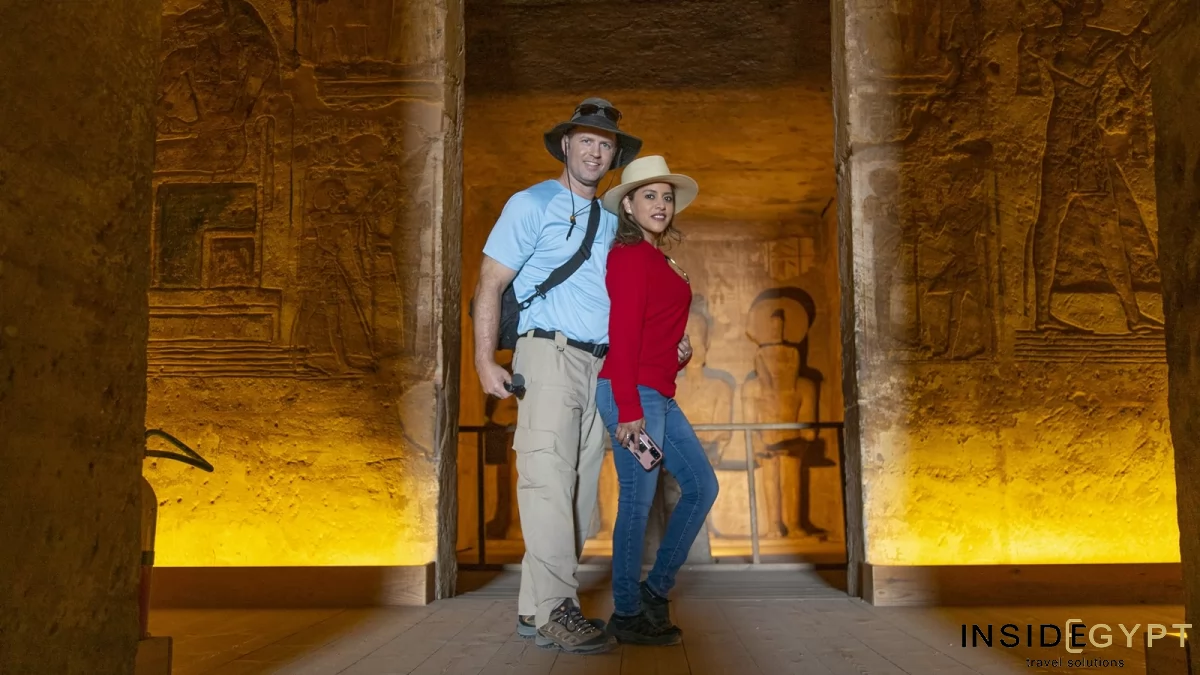
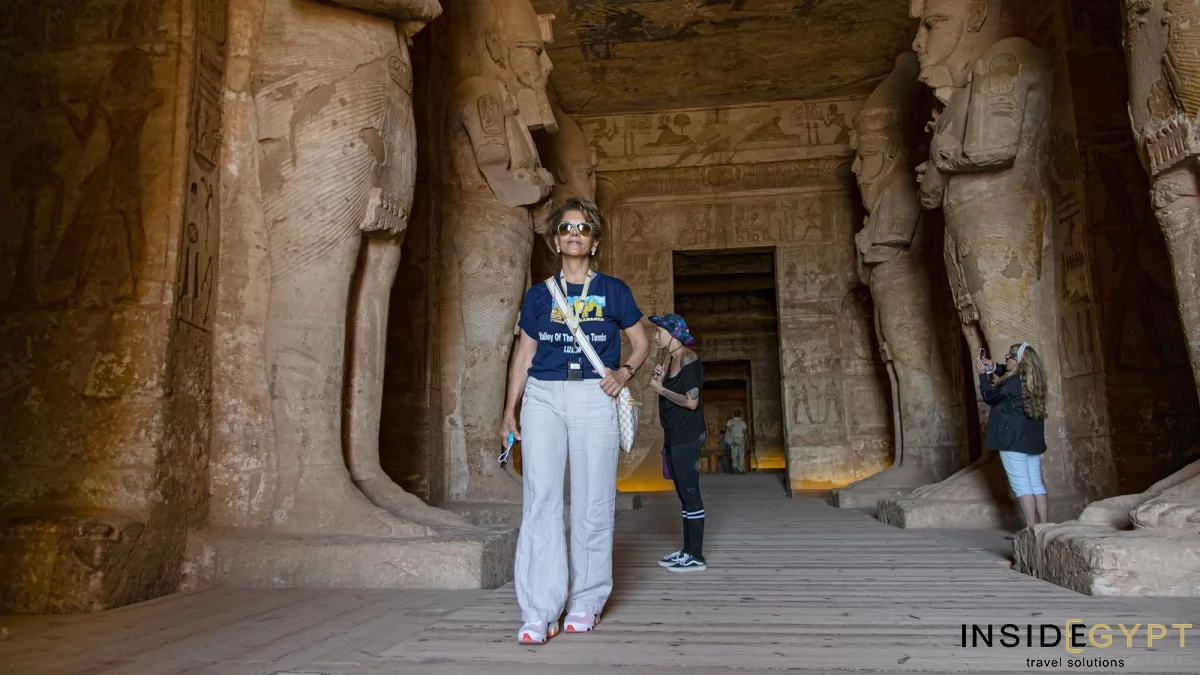
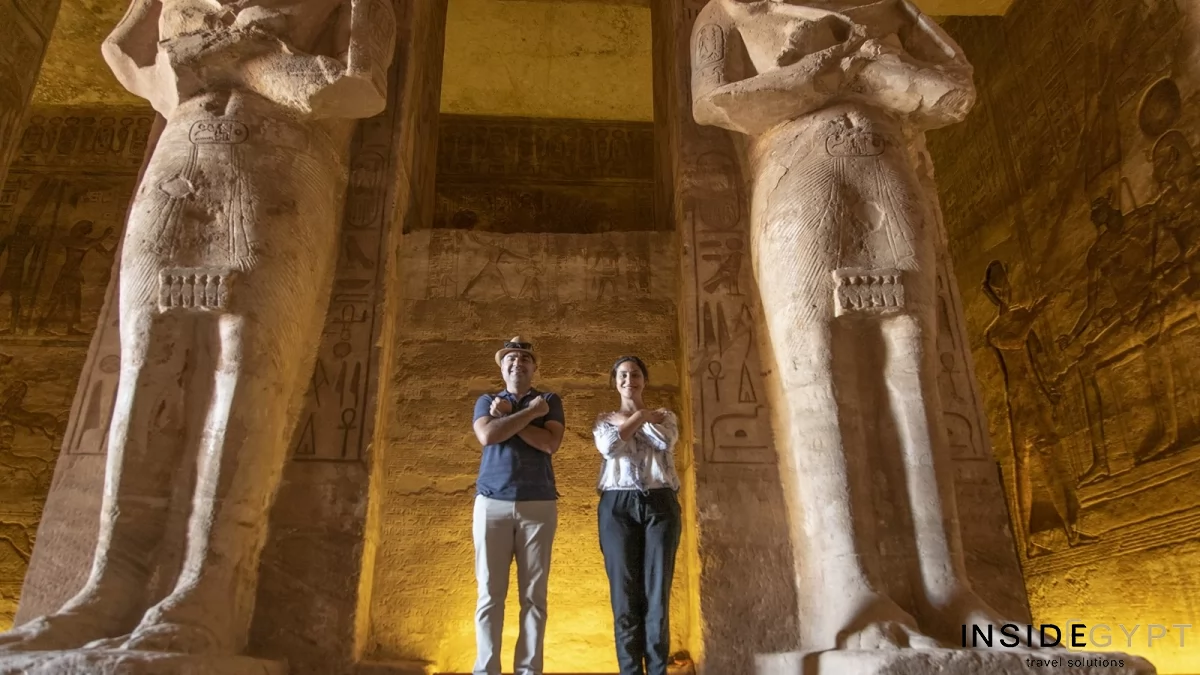
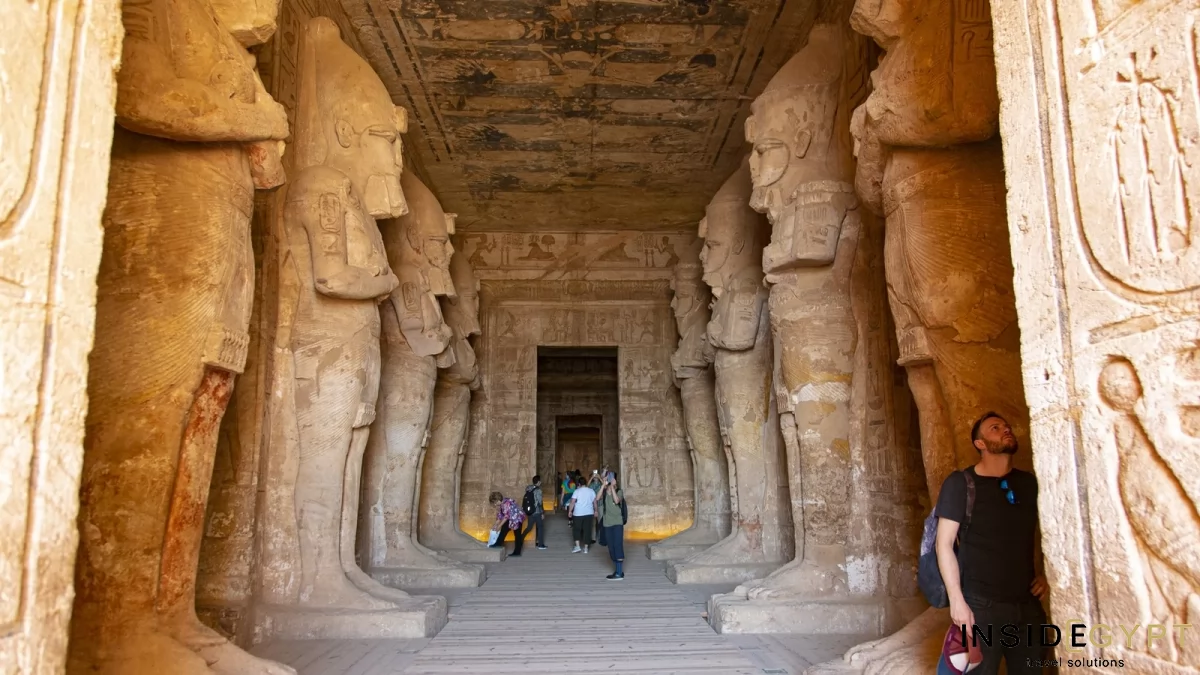
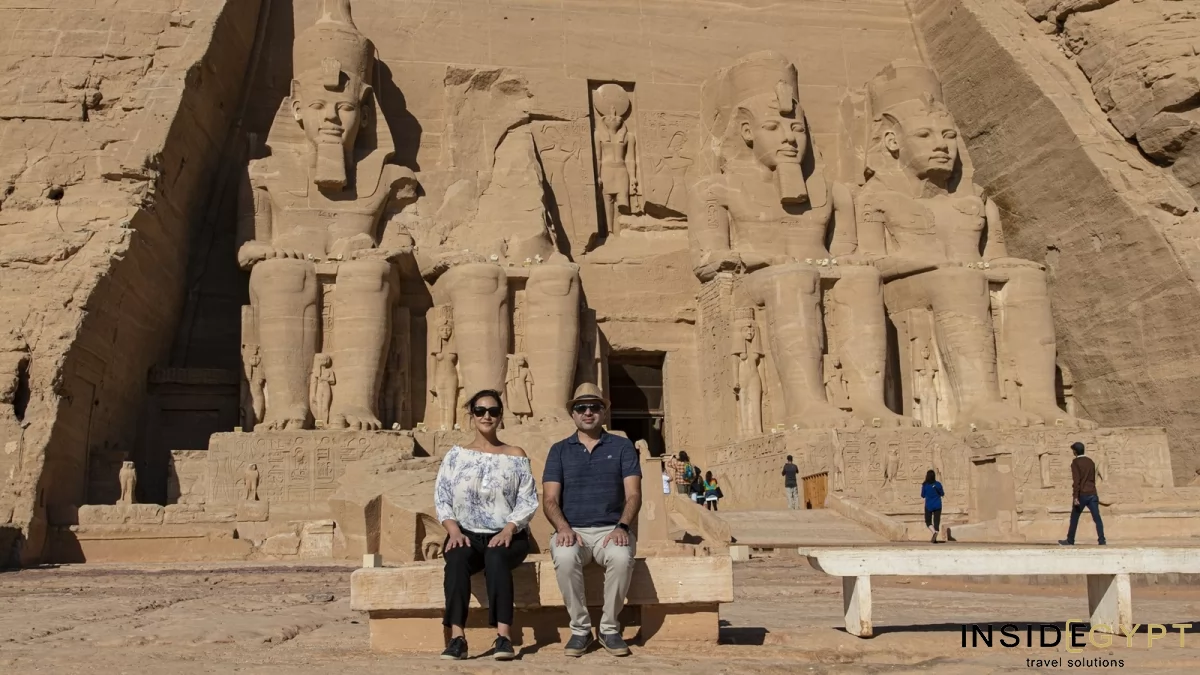
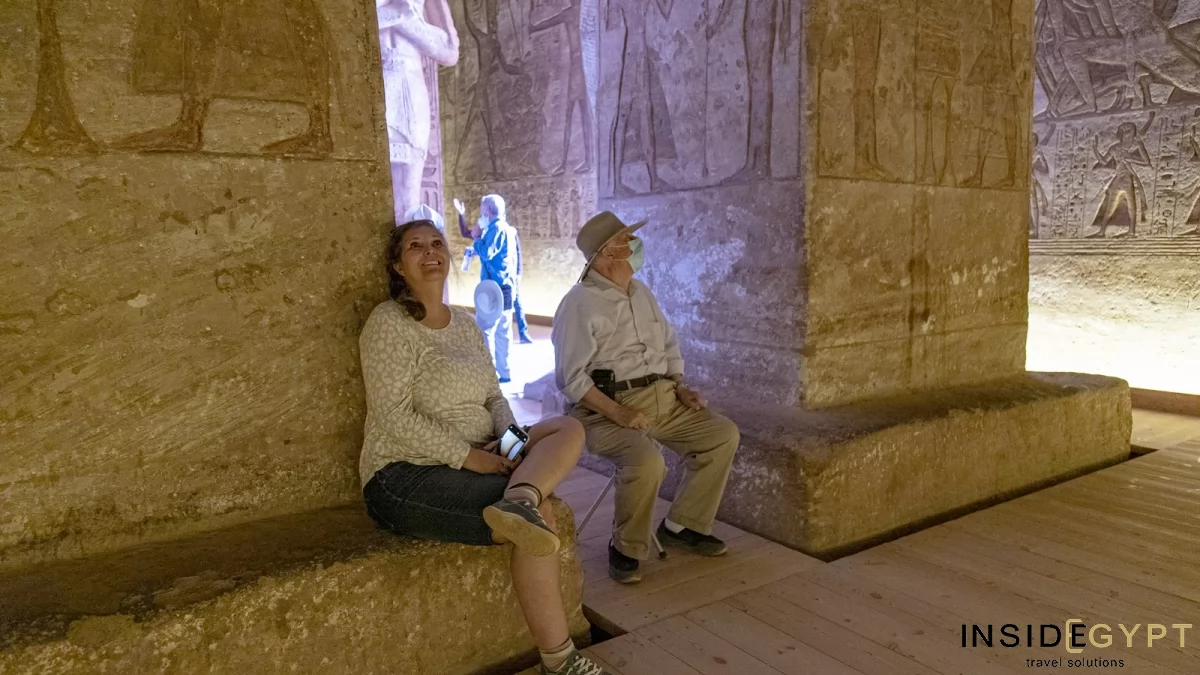
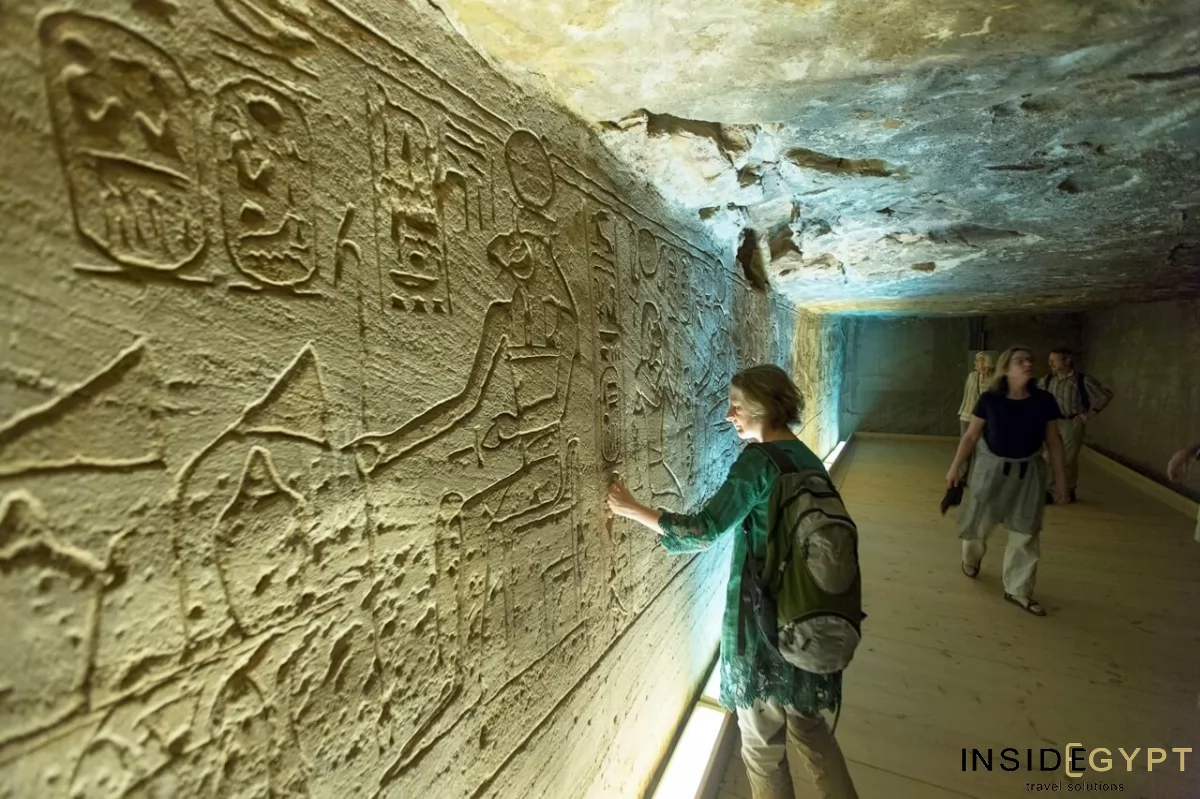
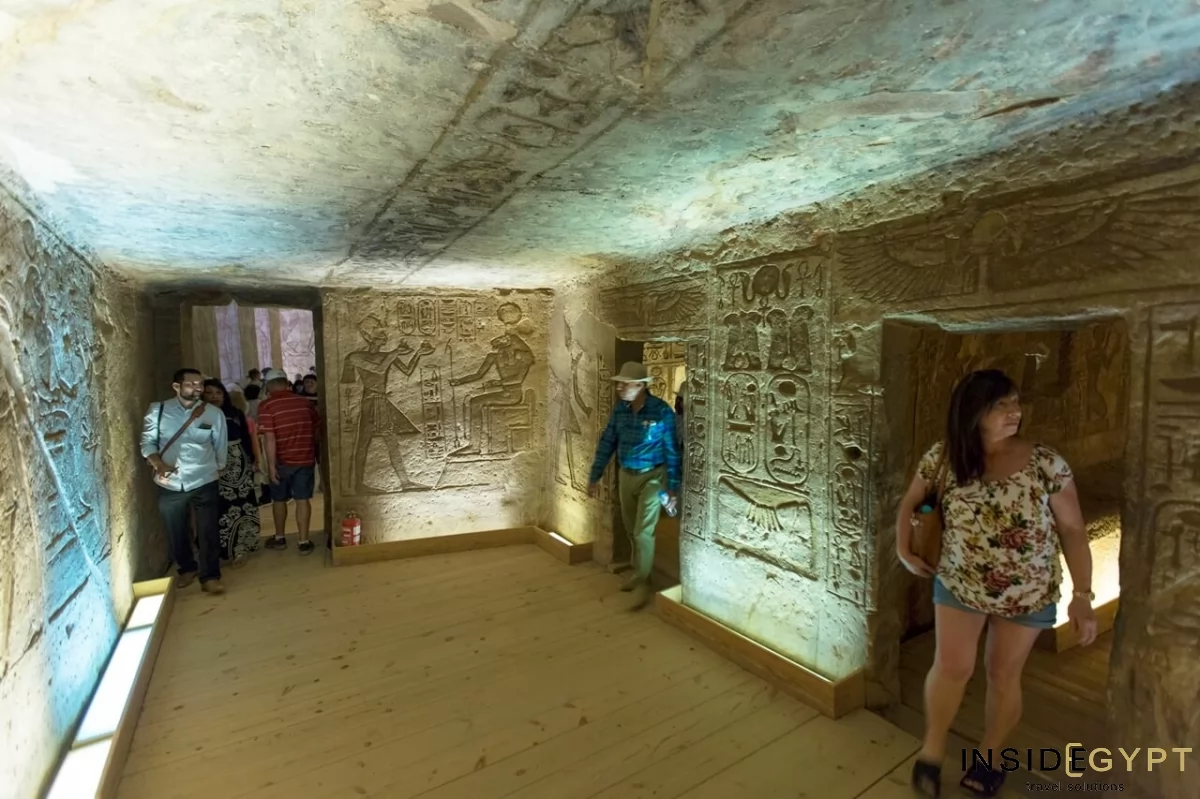
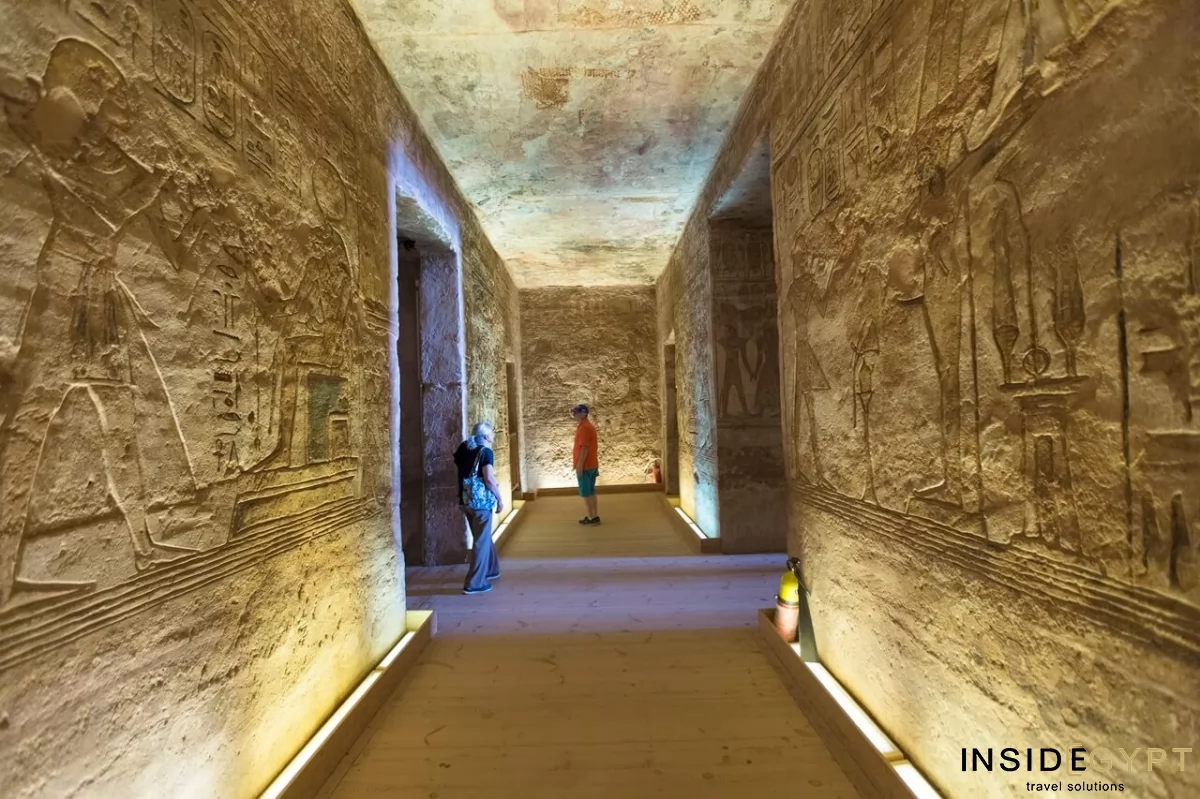
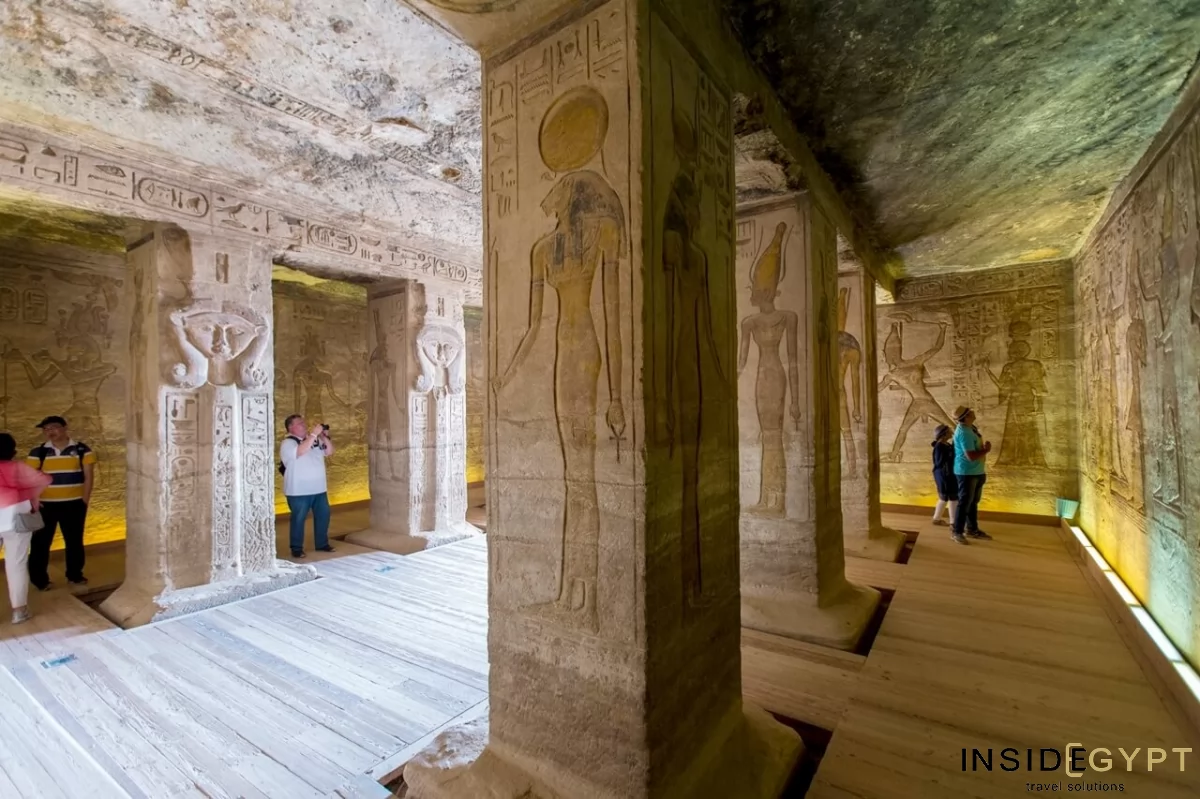
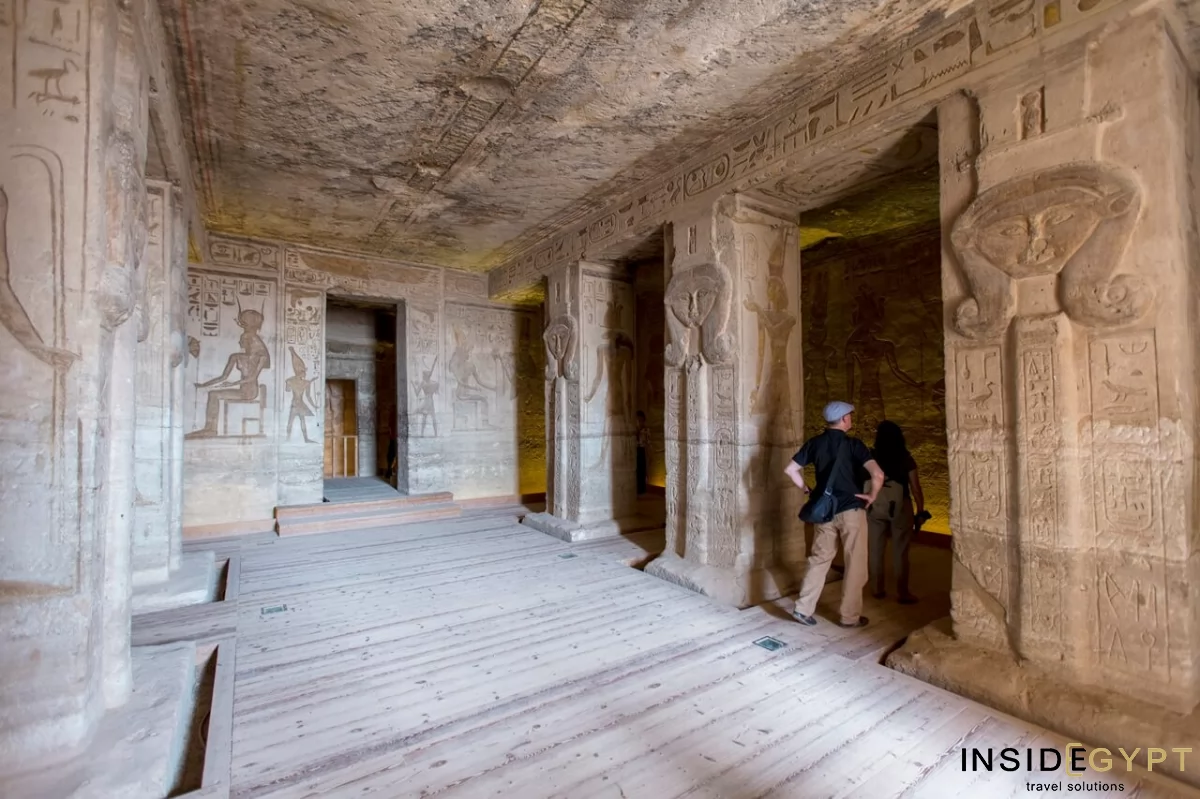
Discover Our Exclusive Egypt Tours
Tour Reviews
Abul Simbel Tour FAQs
Where is Abu Simbel located?
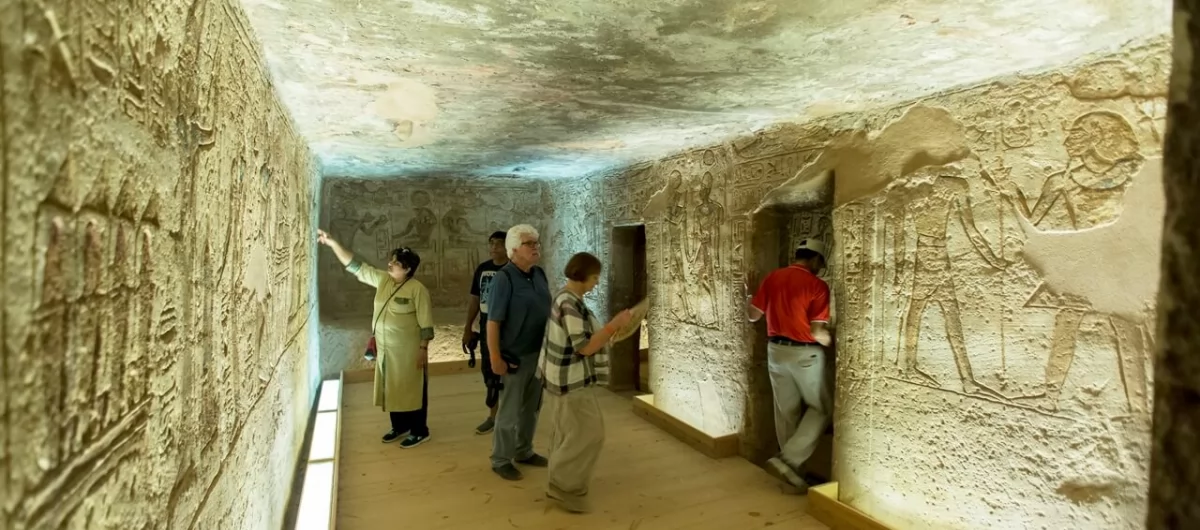
We can view the temples of Ramses II the Great and his wife Nefertari thanks to UNESCO as these buildings were moved from the flooded areas by Lake Nasser. You’ll be able to visit them during our 5-star Nile cruise or as part of our travel packages (such as our 8-day Egypt tour).
To enure that they do not fall underwater the temples of Abu Simbel were moved to a new location about 210 meters from Lake Nasser. This took place over four years from 1964 to 1968. Both temples were cut into blocks, using hand saws, and then transported to the selected location. There they were put back together, placed among the hills, and artificially created on huge concrete domes.
Both rock temples are located just 100 meters from each other in (then) ancient Nubia. Previously the buildings stood near the Nile, surrounded by date palms and coastal reeds. Currently, the sanctuary is surrounded by a gravelly desert. However, the buildings almost shared the fate of another temple, Gerf Hussein, which was flooded by Lake Nasser.
With the construction of the Aswan High Dam, a special committee was established to develop a research program in the surrounding areas, but the relocation of such monumental temples made of stone or carved in rock is a project that requires large financial resources and international cooperation of specialists from many fields. As a result, the temple of Gerf Hussein could not be saved.
How were the temples at Abu Simbel constructed?
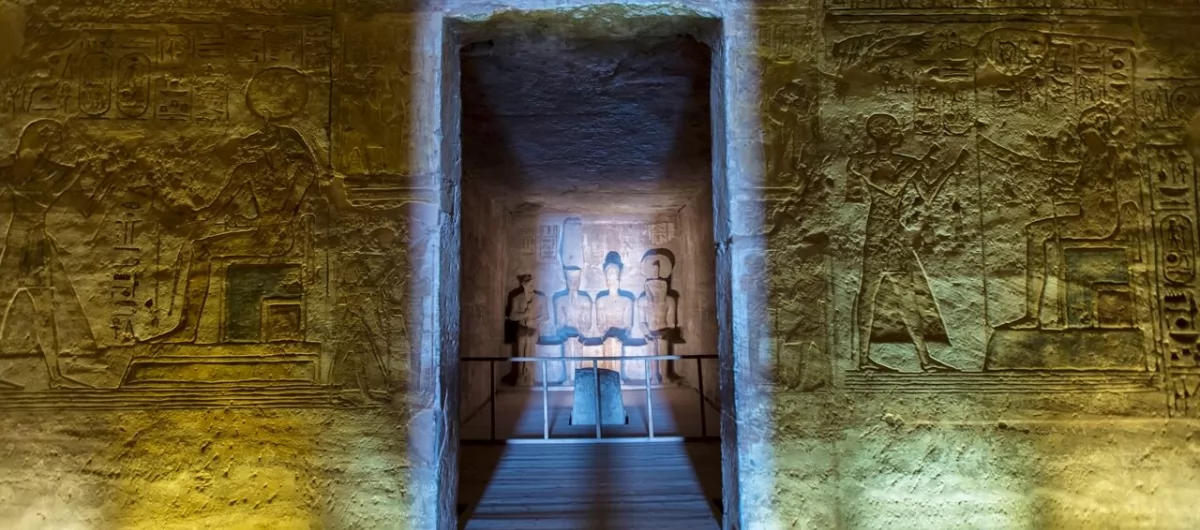
Abu Simbel was built in the mid-thirteenth century BC on the orders of the 15-year-old Ramesses II, later called “The Great.” They were intended as a testament to his power. Over time, the temples were almost completely covered with sand blown from the desert. When they were discovered in 1813 by John Lewis Burckhard, a Swiss scientist and traveler, only fragments of the statues of Ramses II from before the facade of the Great Temple protruded above the surface.
Temple of Ramesses II the Great (Great Temple)
The facade of the temple of Ramses II the Great, also known as the Great Temple, impresses with its panache. Formed in the form of a pylon - a monumental entrance gate, it is 30 meters high and 35 meters wide. In front of it there are four colossal statues of the seated ruler, each of which is about 21 meters high. It is worth looking at the figures of the eminent ruler: the pharaoh is dressed in a traditional royal apron (shendyt) and has a straight beard - a symbol of the living ruler (in the posthumous images the ruler had a curly beard). There were also royal insignia: a special scarf (nemes) and a double crown of Upper and Lower Egypt with ureus (royal cobra). At the ruler's legs there are smaller images of his family members.
Two hypostyle (columnar) rooms occupy a large part of the temple. In the first one, there are eight pillars arranged in two rows. There is also statues of the king depicted as the god Osiris in the crowns of Lower and Upper Egypt. Walking along the walls, you will see the reliefs adorning them that depict scenes of sacrifices and processions of barges with images of deities. The bas-reliefs also show the military successes of Ramses II, including the victory at the famous Battle of Kadesh. In the second hypostyle hall, through which you enter the sanctuary, there are four pillars with painted scenes of sacrifice.
In the back of the temple there is a sanctuary. The Egyptians call them geser-geseru, and therefore "the Holy of Holies". Its peace is guarded by four statues carved in the back wall. They represent the three gods that make up the state triad: Ptah (the creator god, patron of the artists and craftsmen, Amun (another creator god, ruler of the earthly and heavenly spheres), and Re-Horachte (sun god), the god-composed during the lifetime of Pharaoh Ramses II. The Great Temple was built in such way, that twice a year, in February and October, the rays of the rising sun fell on the statues placed in the depths of the sanctuary.
Temple of Nefertari (Little Temple)
Right next to the temple of Ramses II the Great, there is a much smaller temple for his wife, Nefertari. At the time it was a rare custom to build separate temples for the queens. In front of the building's façade, four statues of a standing pharaoh and two of Nefertari are proudly presented. The crown of the royal wife, the composite, is impressive. It consists of carved ostrich feathers and a solar disk and is surrounded by cow horns. They were a symbol of Hathor, identified with the heavenly queen. This goddess watched over the safety of the queens, which is why the temple was dedicated to her.
References to Hathor can also be seen inside the temple. The pillars in the hypostyle hall have Hathoric capitals, so they represent the face of the goddess with cow ears, and in a heavy three-part wig. The image of Hathor as a divine cow was also carved in a niche in the western wall of the sanctuary.
Want to see them with your own eyes? Our tailor-made tour takes you to this and more! Book your Egypt tour package!
Can You Go Inside Abu Simbel?
.webp)
Can you go inside Abu Simbel? Of course, you can! The participants of our Abu Simbel tour will also get to see both temples from the outside and visit them inside with a ticket.
For an additional fee, it is also possible to enter the man-made mountain of Abu Simbel (the temple of Ramesses II the Great). By taking part in this additional Abu Simbel temple tour you can go behind the scenes to explore one of the greatest challenges of archaeological engineering in history! If you are interested in knowing how they reconstructed one of the greatest monuments in the world, visiting the inside of the man-made mountain of Abu Simbel temple will be a special treat for you.
On a tour of Abu Simbel with Inside Egypt, you will have the opportunity to visit the temple of Ramesses II the Great from a completely different perspective – from the inside of the man-made mountain. This place has been closed to all the other tourists for almost 20 years now.
Which Other Nearby Monuments Will We Visit?
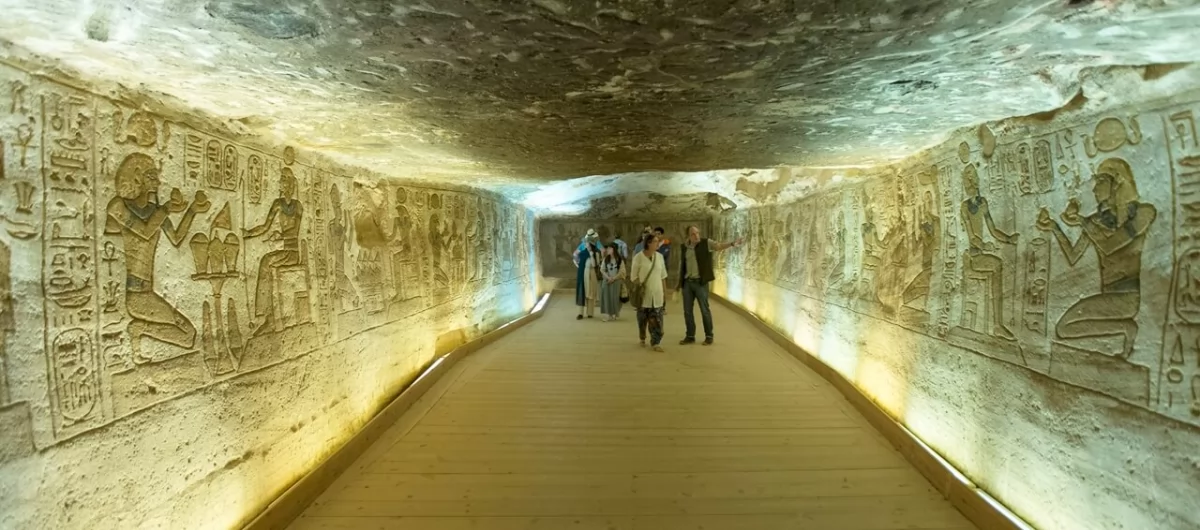
There are several Nubian monuments worth visiting when you take a trip to Abu Simbel. Close by, you will find the temple of Kalapsha and Wadi es Sebua (the Valley of the Lions). Wadi es Sebua is located in the south of Egypt in Lower Nubia. It is the site of two New Kingdom Egyptian temples, including one speos temple constructed by the 19th Dynasty Pharaoh Ramesses II. A little further north is the Great Aswan Dam. These facilities can both be visited as part of our Abu Simbel private tour.
As part of our standard Egypt tours including Abu Simbel, you can also visit the temple of Isis in Aswan, which is located on the island of Agilkia. Like the temples in Abu Simbel, this complex was moved from the island of Philae to another similar island, as it was in danger of flooding due to the construction of the Great Aswan Dam.
You can also take a motorboat to one of the Nubian villages near Aswan when joining one of our Egypt tours including Abu Simbel. By visiting an indigenous village, you can see and learn about the rich heritage of the Nubian community. The Nubian people speak both the Nubian language and Arabic and follow an age-old tradition of painting their houses vibrant reds, yellows and blues. The Nubian community dates all the way back to the Paleolithic era (the Old Stone Age).
The Unfinished Obelisk is also close and can be visited as part of an Abu Simbel temple tour. Visiting the ancient quarry near Aswan, you can see how the Egyptians created their famous obelisks that now grace the famous squares in Paris, Rome, New York and Istanbul.
Is Visiting Abu Simbel Part of Your Nile Cruise Itinerary?
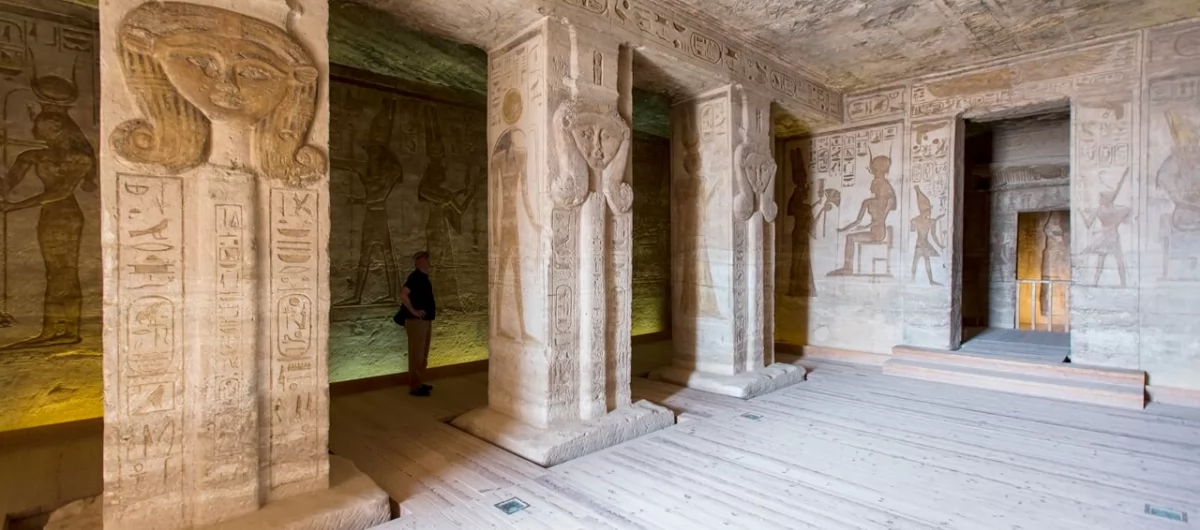
Yes, visiting Abu Simbel is part of our Nile Cruise Itinerary. Our guests will get the amazing opportunity to see and admire all of the wonderful ancient monuments up close during the cruise from Luxor to Abu Simbel. A luxury ship on the Nile is a 5-star floating hotel with high-standard amenities, delicious food, and personalized service. Our guests will be well-rested and well-fed throughout their Abu Simbel Nile cruise journey.
Participants of our Nile cruise tours including Abu Simbel also have the opportunity to relax not only in comfortable cabins, but also on the upper deck of the ship. There are wonderful views from the ship during the cruise from Luxor to Abu Simbel.
A cruise on the Nile by luxury ship is very comfortable and is the best means of transport when exploring southern Egypt. A cruise from Luxor to Abu Simbel will allow you to visit most of the historic buildings and tourist attractions that are located a short distance from the river.
Our Nile cruises take place on the Luxor - Aswan or Aswan - Luxor routes. Rather than just visiting one city, our Egyptian travel packages let you visit numerous locations along the river to experience the Nile's history and culture fully. We will stop at some of the most iconic landmarks along the way, in addition to a visit to Abu Simbel: Thebes, Tutankhamun's tomb, Temple of Edfu, and Kom Ombo. This luxury Nile cruise and the Abu Simbel tour are included in our all-inclusive Egypt tours.
Are The Tickets Included?
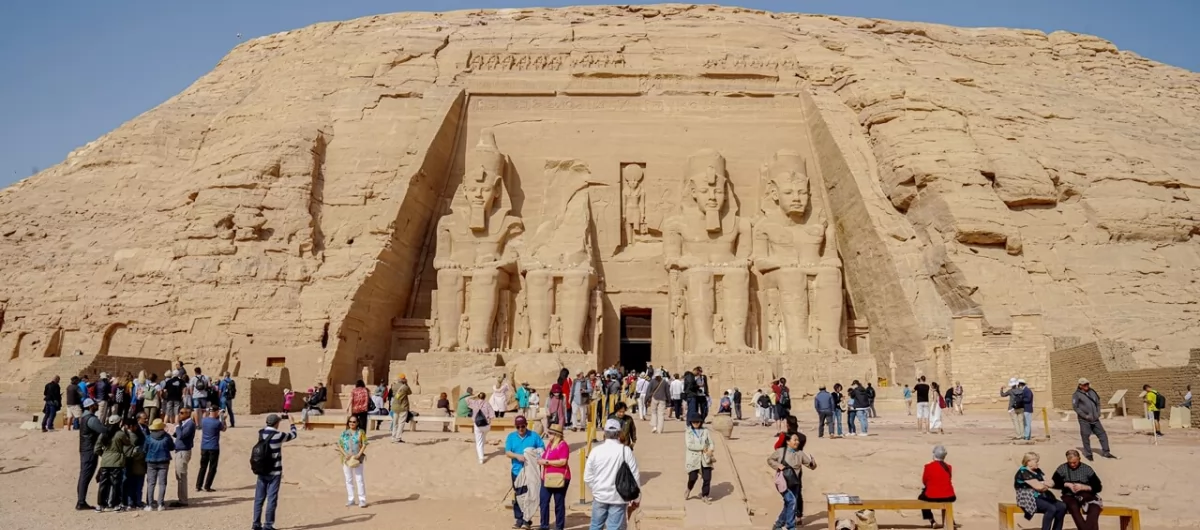
The cost of our Abu Simbel tour already covers the cost of entrance tickets, so there's no need to worry. For the convenience of our guests, we purchase tickets to Abu Simbel well in advance. This avoids queues and wasting time unnecessarily.
When visiting the spectacular temples of Abu Simbel, you are allowed to take photos of the exterior of the temples, but not the inside, unless you purchase a camera photography ticket for 300 EGP. You will have to pay an additional 20 EGP to use a tripod while taking pictures.
Additional tickets can be purchased at the entrance to the Abu Simbel archeological site.
A Sound and Light Show is also organized in Abu Simbel in the evening. Ticket costs EGP 500.
The Abu Simbel hours of work are from 6.00 a.m. to 5.00 pm.
How Much Does This Tour Usually Last?
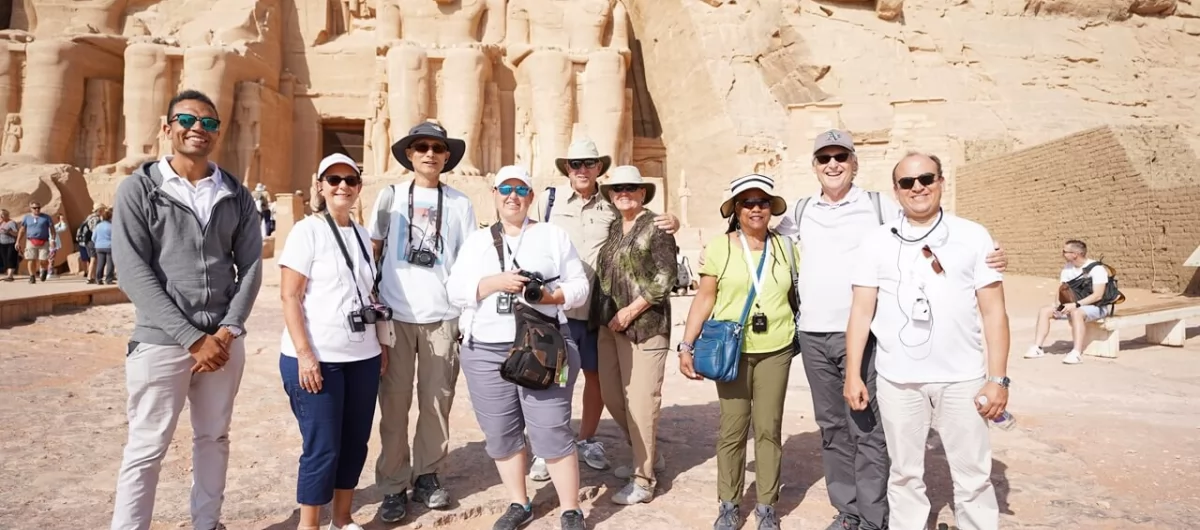
The trip to Abu Simbel from Aswan takes approximately 3 hours. We leave Aswan at 04.30 in the morning, and we travel to Abu Simbel in a convoy. This will ensure that we are on-site before 08.00 in the morning. The journey to Abu Simbel takes place in a comfortable coach. The Abu Simbel cruise ship staff will prepare a breakfast box for tour participants, which can be eaten during this trip.
A tour of the temples of Abu Simbel with our professional guide takes about 3 hours. During the journey to Abu Simbel, our guide makes the most of the journey providing the participants with information about the region and the temples in Abu Simbel. Around 10.30 - 11 am we will start our journey back to Aswan. After returning to the ship, a delicious lunch awaits the participants.
Will We Have a Guide Joining Us?
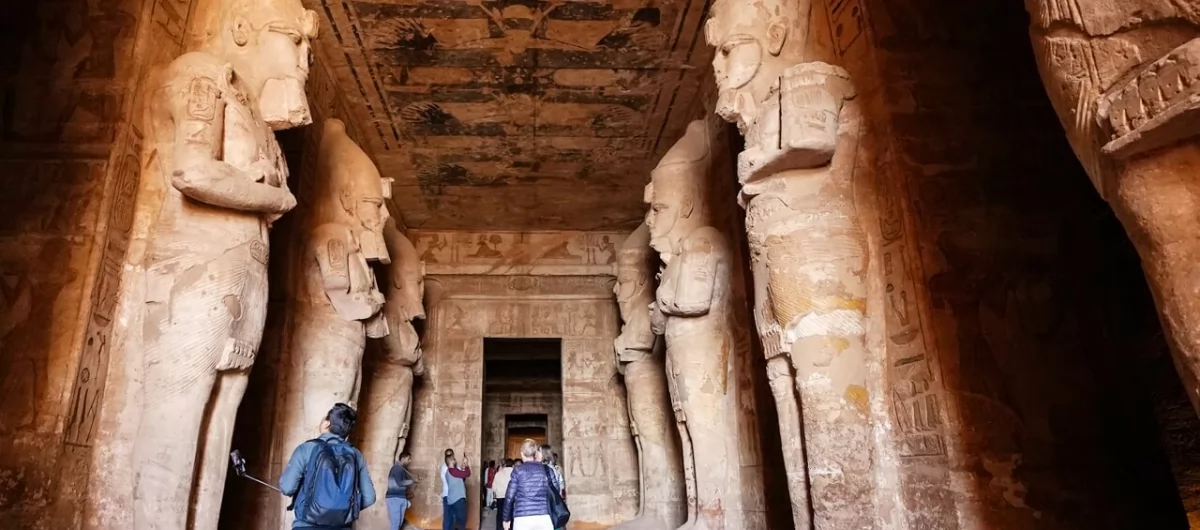
Our Abu Simbel temple tours are led by an experienced guide - an Egyptologist, who is knowledgeable about the history and significance of this ancient site. The guide speaks perfect English and is cheerful, which makes him a great companion during your visit. He is a great storyteller too and brings to life stories of the pharaohs and gods, and even teaches our guests how to read hieroglyphics found on the walls of the temples.
Our guides are distinguished by their knowledge, expertise, and enthusiasm for their work. Guides of this class make our trip to Abu Simbel an exclusive experience.
During your visit to Abu Simbel, if something catches your attention and you want to know more about it or if you have a question on your mind don't hesitate to speak up!! Your curiosity will be satisfied and all your questions answered in detail. We encourage you to ask your guide questions and engage with them, to make the most of your visit to Abu Simbel. Such an interactive experience is an amazing, uplifting, and educational opportunity experience one you will surely remember for many years.
Can I take photos inside the Abu Simbel Temples?
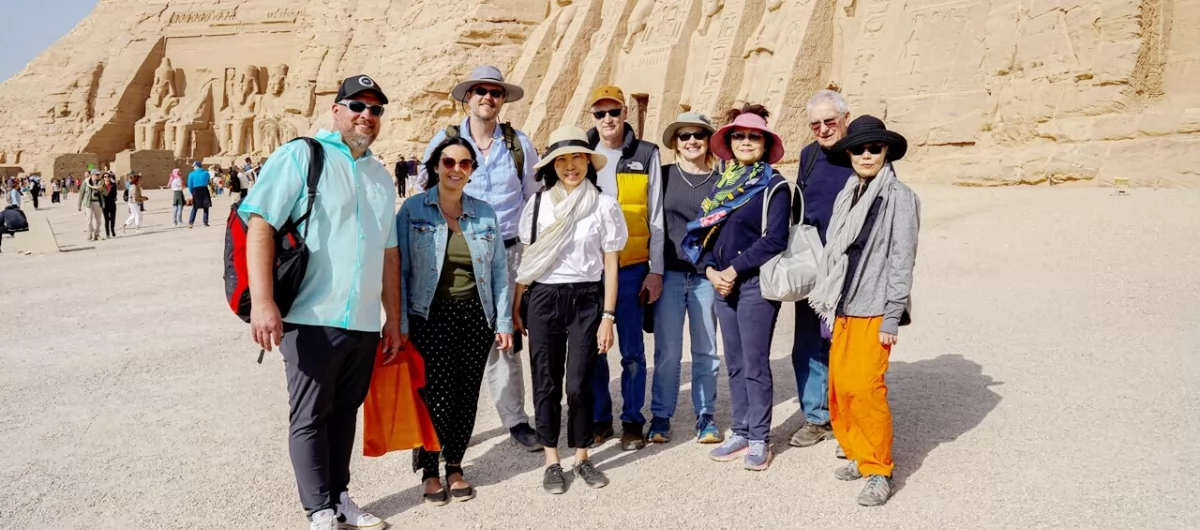
Any tour of Egypt including temples in Abu Simbel would be an amazing photographic experience. You can take pictures with both a professional camera and a mobile phone outside the temples in Abu Simbel.
To photograph the interior of the temples on an Abu Simbel tour with a DSLR camera, you will need to purchase a special ticket, which is not included in the usual ticket price. Costing 300 EGP, which can be purchased at the entrance gate, it's worth doing to get some good shots of the ancient Egyptian wall carvings. If you have a tripod with you to take steady photos free of movement, you must also purchase a special ticket for the tripod in the amount of 20 EGP per site, per day.
Photos taken with a mobile phone without using a flash while inside the temples of Abu Simbel during an organized tour are allowed and do not require the purchase of an additional photo ticket.
What is the dress code for visiting this site?
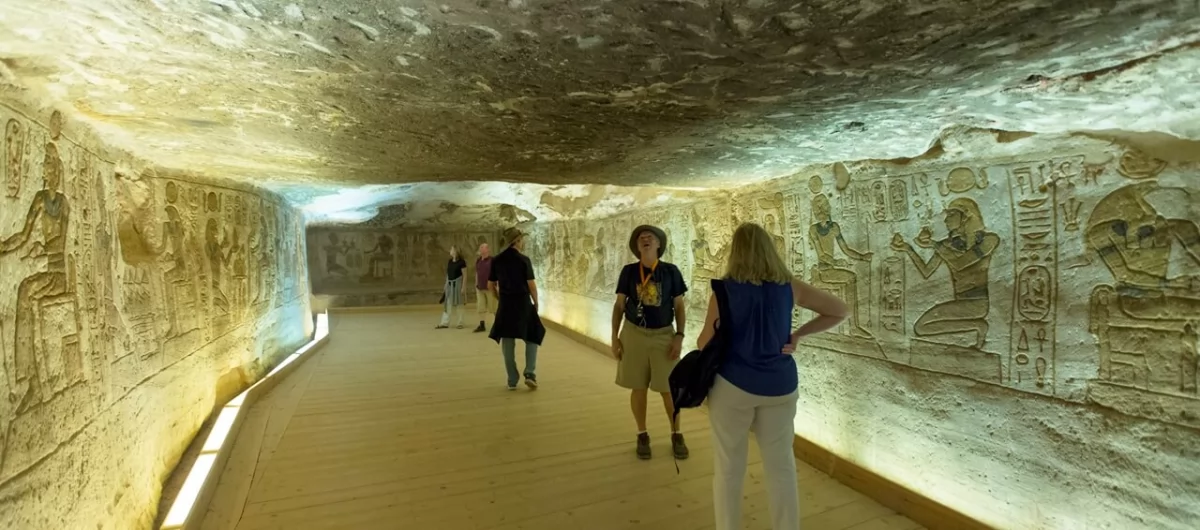
When visiting the Abu Simbel temples, one of the things you should think about is what you will wear. As the Abu Simbel temple tour is a half-day trip, it takes at least 9 hours in total. Including the journey, you will need comfortable clothes to protect your body from the sun, and allow you to move easily while touring Abu Simbel.
During the tour, breathable clothes in light colors that are made of natural materials are the best option. Cotton, linen and viscose will be your greatest allies. Clothing should be loose and cover as much of the body as possible.
With a safari-brimmed hat, or at least a light-colored peaked cap, you have sufficient protection on your trip to Abu Simbel. The sun is harsh and will burn your skin quickly, especially if you are blond and fair-skinned.
Make sure that you take sunscreen with SPF 50. Always rub it on your face, neck and other unclothed body parts, reapplying when required. If you want to protect yourself further from the sun's rays, you can also wear a long-sleeved shirt made of airy linen. Take with you a white scarf made of cotton or linen, which you can use to cover the neck, head and ears during the Abu Simbel tour.
As well as your head and body, you should protect your eyes from the sun. Bring along sunglasses with UV filters and tinted lenses.
Comfortable footwear is also very important. We recommend walking shoes or comfortable sports shoes. Shoes should not be brand new as these can rub your feet, causing blisters.
Proper clothing will make your trip to Abu Simbel as comfortable as possible, providing a thoroughly enjoyable experience.
Ready to join an exclusive tour of Abu Simbel?
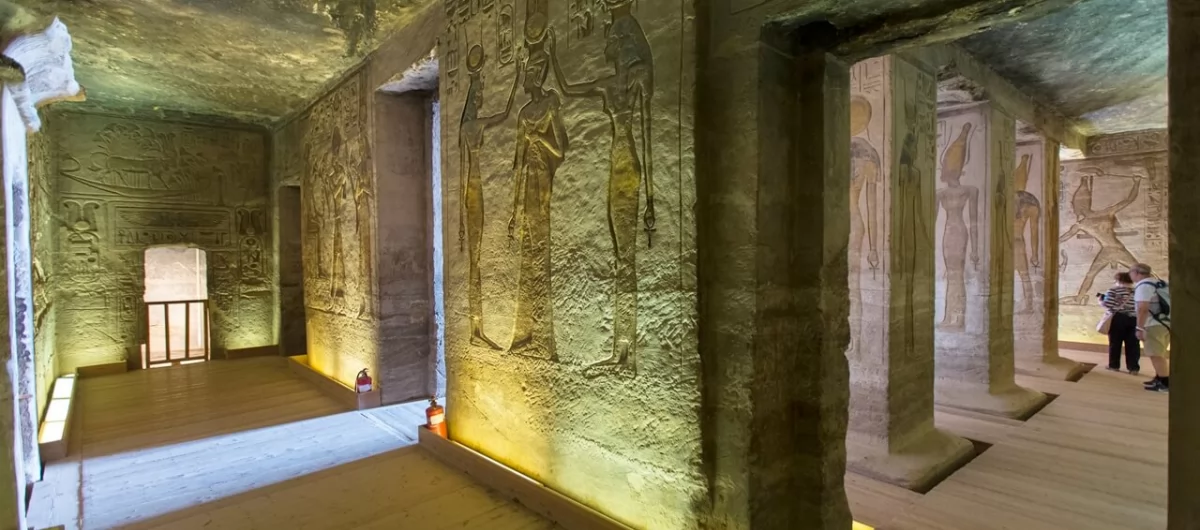
If you value the freedom to travel and dream of an amazing, tailored itinerary including Abu Simbel, then you will love our luxury tours. Inside Egypt offers tours that allow guests to visit Abu Simbel and tailor their itinerary to their interests and preferences.
The individual organization of our Abu Simbel temple tours and visits to other Egyptian monuments according to your precise expectations, allow you to experience truly unique adventures. Our custom-made Egyptian tours often include Abu Simbel, and will give you the flexibility, personalization, and exclusivity you want. You can then be sure that you will experience exactly what you when working with us!
To organize an Abu Simbel tour with an individual sightseeing itinerary, please contact us via the contact form on our Luxury Egypt Private Tours page. Our team of specialists will then contact you as soon as possible with the offer of an Abu Simbel tour and beyond.
